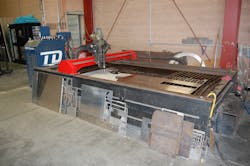Name/title: Barry McKenzie, general manager
Company: Utah Tank & Trailer, Salt Lake City, UT
Operation: A 65,000-sq.-ft. predominantly tank trailer sales and repair facility employing 25 technicians
Problem:
When you are in the business of maintaining and repairing tanker trailers for a living, you are being called upon to take care of equipment that’s expected to be in operation for a long, long time—sometimes as long as 20 years.
That can pose some issues, however, when it comes to finding specific components and parts. Not only do such items become more difficult to obtain as the trailer ages, it often becomes impossible to get hold of parts within the time frame expected by a customer.
“Uptime is critical in the trucking business,” explains Barry McKenzie, general manager for Utah Tank & Trailer. “Remember, too, that tankers are typically the most expensive type of trailer in operation—some cost six figures. Customers don’t want something that costly sitting idle.”
In business for 15 years, Utah Tank & Trailer operates an eight-bay 65,000-sq. -ft. shop that sits on a five-acre site, along with 14,000 sq. ft. of warehousing space that keeps some $1.8 million worth of parts close at hand for all manner of tank trailer repairs. Still, that vast inventory sometimes isn’t enough.
Solution:
Three years ago, Utah Tank & Trailer bought a plasma-cutting “table” that allows virtually any part needed to be made out of a wide choice of metals onsite. To say the least, the company’s solution to its problem proved to be different.
“It’s a 300-amperage, high-definition, plasma-cutting machine that can duplicate factory parts or be used to make our own specialty designs,” McKenzie notes. “Almost every tank trailer model is different in some way and customized to fit specific needs.”
Plasma is created by heating a gas or subjecting it to a strong electromagnetic field applied with a laser or microwave generator. This can then cut through electrically conductive materials, including steel, aluminum, brass and copper.
Plasma cutting is attractive because of the ability to make high-speed, precision-metal cuts with a relatively low cost of operation. The machines, though, typically can cost well into the five figures.
For Utah Tank & Trailer, the results for customers far outweigh any of the investment costs.
“Why plasma? Because we have no time to wait,” McKenzie explains. “If a part is available, we’ll buy it and have it shipped to us because, of course, it costs more to make a part than to buy it. We’ll only build it if we can’t find it.”
The plasma-cutting machine also allows Utah Tank & Trailer to offer customization services such as the ability to “dress up” tanks and even trucks with specialized nameplates cut out of steel or aluminum plates.
“Our customers are typically of a higher profile. They’ll often look for something a little extra to help them stand out,” McKenzie says. “But that doesn’t mean they’ll accept lower quality. They want anything we do done right, and done right the first time.”
But when it comes to meeting customer demands for faster turnaround time and custom items, the facility’s plasma-cutting machine is worth its weight in proverbial gold, he says.
“Can we put a pencil to its exact value? No,” McKenzie stresses. “But we get an awful lot of additional business because our customers know we have it. We can build stuff no one else makes and if something is broken, we can repair it better than the original. And it also gives us the ‘soup to nuts’ ability to repair almost any kind of tank trailer: food grade, petroleum, dry bulk, you name it.”
About the Author
Sean Kilcarr
Editor in Chief
Sean Kilcarr is a former longtime FleetOwner senior editor who wrote for the publication from 2000 to 2018. He served as editor-in-chief from 2017 to 2018.
